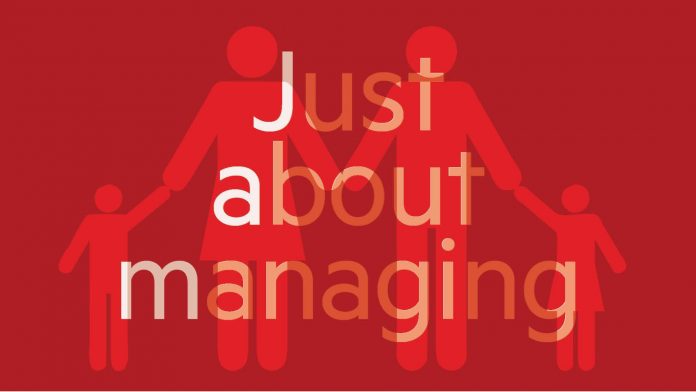Family incomes are set to start slowly rising again next year but low and middle income households risk missing out with three years of stagnating living standards lasting until 2020, according to the Resolution Foundation’s annual living standards outlook published today (Thursday).
The report brings together the OBR’s latest economic forecasts with policy impact assessments to show what’s in store for household incomes over the parliament, and how different households across the income distribution might fare.
The report finds that the post-referendum period of high inflation, which has caused the return of falling real pay and deepened cuts to working age benefits, means typical household incomes are projected to have fallen marginally this financial year (2017-18). This would make it the worst year for income growth since 2011-12, and the third worst in the last 25 years.
But with inflationary pressures easing and some signs of pay growth rising, the Foundation forecasts that median incomes will start to rise again in the next financial year (2018-19) and the remainder of the parliament. However, the pace of growth could be sluggish, peaking at just over one per cent a year (1.3%) by the end of the parliament – well below the 2.1% average rate of income growth households enjoyed before the financial crisis.
The Foundation also warns that Britain’s eight million working age families on low and middle incomes risk missing out on any growth in the coming years, with three years of flat or falling living standards between 2017-18 and 2019-20.
This would mean an income rise of just £300 (or 2%) over the decade to 2020 for the families Theresa May calls the ‘just about managing’, compared to a £3,100 rise (10%) for higher income working age households.
The Outlook says that big cuts to working age benefits lie behind the poor outlook for low and middle income families, which risks the first sustained rise in inequality since the late 1980s. Levels of income inequality are, on some measures, projected to reach record highs by the early 2020s, having fallen in the immediate aftermath of the financial crisis.
The Foundation notes that welcome policies such as the National Living Wage will continue to reduce wageinequality over the parliament, with the minimum wage on course to increase twice as fast as average wages between 2015 and 2020. However, this is more than offset by the rollout of £14bn welfare cuts.
While avoiding this income stagnation, the outlook for higher income households is also relatively weak. That’s in part because rate rises over the next few years are expected to dampen disposable income growth for home owners. This marks a reversal of the big living standards boost that low interest rates have provided for mortgagor households since the crisis.
Adam Corlett, Senior Economist Analyst at the Resolution Foundation, said:
“2017 was a disastrous year for living standards as high inflation caused pay packets to shrink and made the cash freeze in working age benefits bite harder. The good news is that living standards are set to start rising again next year. The disappointing news is that the recovery is set to be slow. And the really worrying news is that low and middle income households could miss out altogether, with three years of stagnating incomes running right through to 2020.
Torsten Bell, Director of the Resolution Foundation, said:
“This parliament risks seeing the first sustained rise in income inequality since the 1980s. But the story this time around is less about the rich soaring further away, and more about poorer families falling further behind as they bear the brunt of £14bn of welfare cuts.
“Lots of factors lie behind projections of a parliament of weak income growth, many of which are beyond the government’s immediate control. But it is policy decisions, not capitalism, that look set to drive living standards of low and middle income families down and inequality up in the years ahead. Recent years of economic anxiety and political division should have taught us that this is the last thing Britain needs.”







